What is it? Harsh survival expertly coupled with an intriguing sci-fi story
Expect to pay: TBC
Developer: 11 bit studios
Publisher: 11 bit studios
Reviewed on: Intel i9-13900HX, RTX 4090 (laptop), 32GB RAM
Steam Deck: TBC
Multiplayer? No
Link: Steam
Jan's the only survivor of an intergalactic mining operation that's gone horribly wrong, and he's the last person anyone would hope was the last person standing in an ‘all alone on an alien planet so hostile just standing around outside could kill someone’ scenario. He's also going to be burned into a cosmic crisp in a matter of days unless I get on top of this mess right now.
So my first few in-game days in The Alters are spent running around in a blind panic, trying to patch Jan's distinctive base-in-a-giant-wheel up as quickly as possible so I can get the hell away from wherever here is before the sun rises and soaks the land in its deadly rays.
With the stakes being so high from the moment the game begins, I make a real effort to squeeze every last minute's worth of work out of Jan, sending him scurrying outside for precious resources and running around inside to create life-saving items from the raw materials he's found.
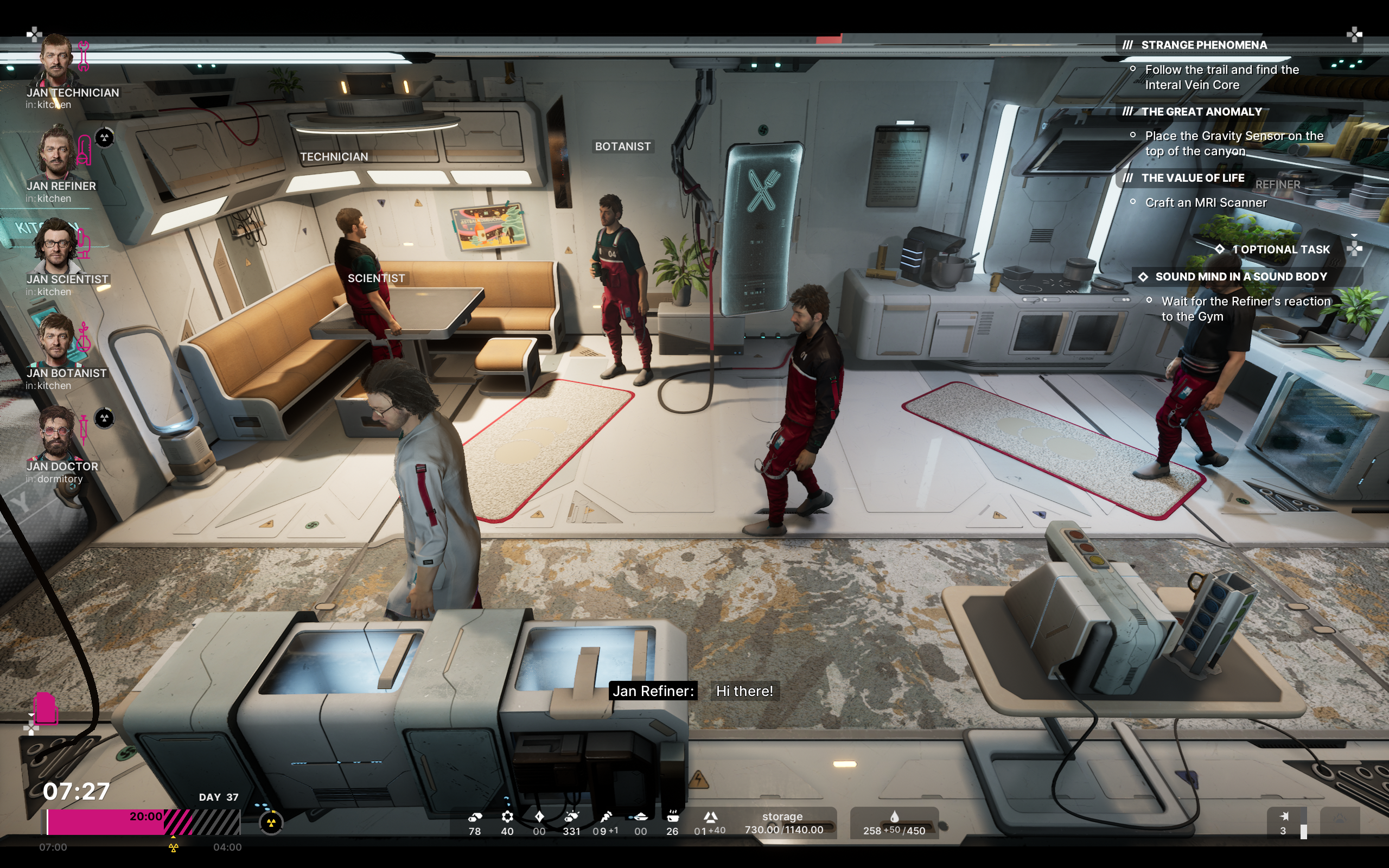
Working him to the bone sounds like the obvious choice in this high-stress situation, but I can't do that either. If I make him work for too long it'll seriously slow him down, and if I ignore his tiredness and carry on (because death by sunlight is only a few days away) he might even collapse, which is even worse than taking a break right in the middle of an important task to get some sleep.
I'm stressed out now, trying to do ten jobs all at once as one person. Enthralled, too. I can't leave Jan in the middle of this mess, not when it looks like there's a real chance I could finally get on top of things and roll him away to safety.
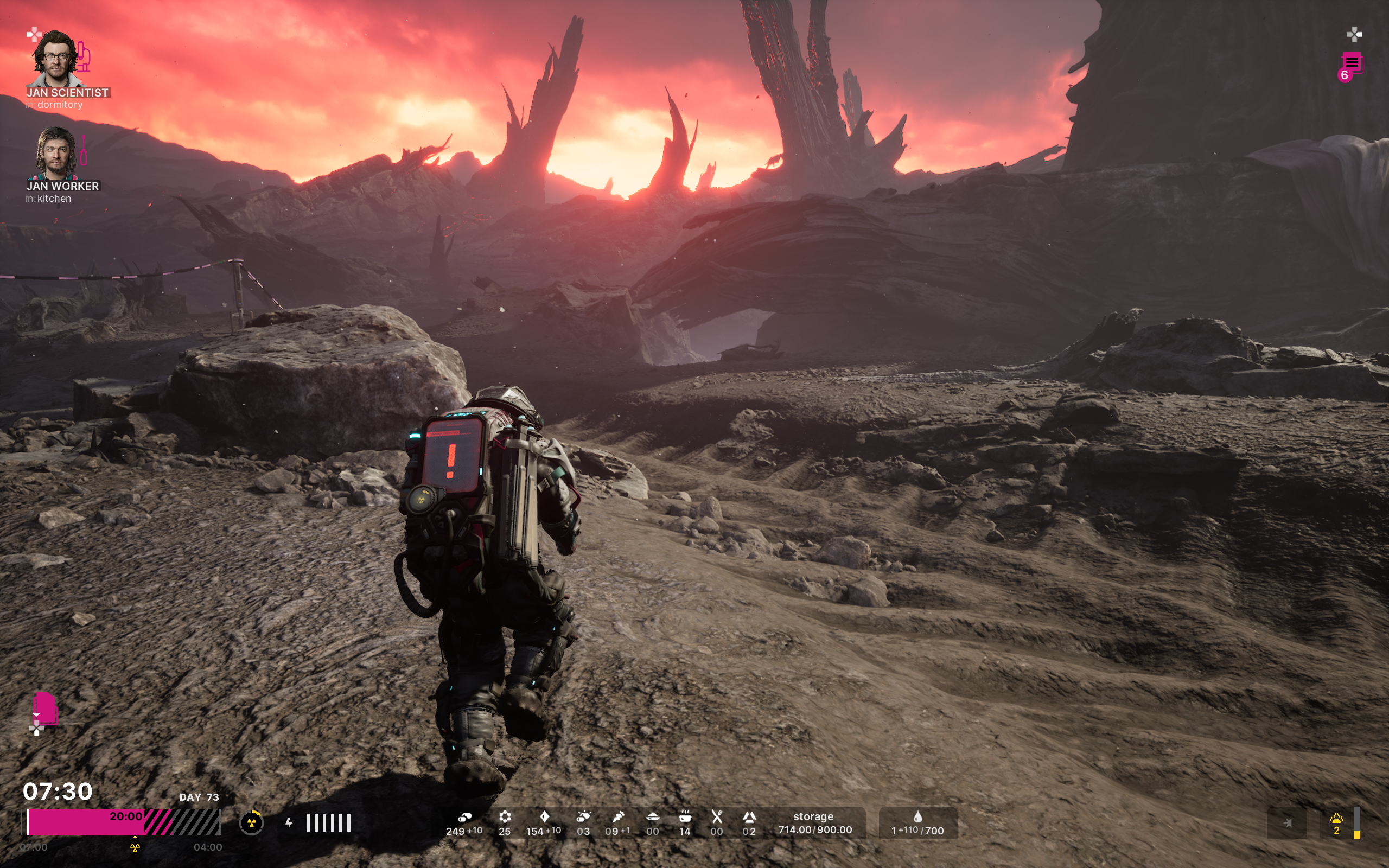
Helping myself
What I didn't realise at the time was that this was the game's idea of gently easing me in. This was the simple part. The nice part. And I was never more than one scripted malfunction away from disaster. No matter how hard I tried, solo success was never an option. Performing illegal and deeply immoral experiments involving this hostile rock's unique element, rapidium, was though.
Creating altered versions of himself that, thanks to the exploration of quantum ‘what-if’ alternatives to his own life, have vastly differing skills and personalities, isn't Jan's idea. But the people who offered him this surreal chance to survive are very interested in his success—maybe even interested enough to put some extra effort into rescuing him if he can deliver the results they're after.
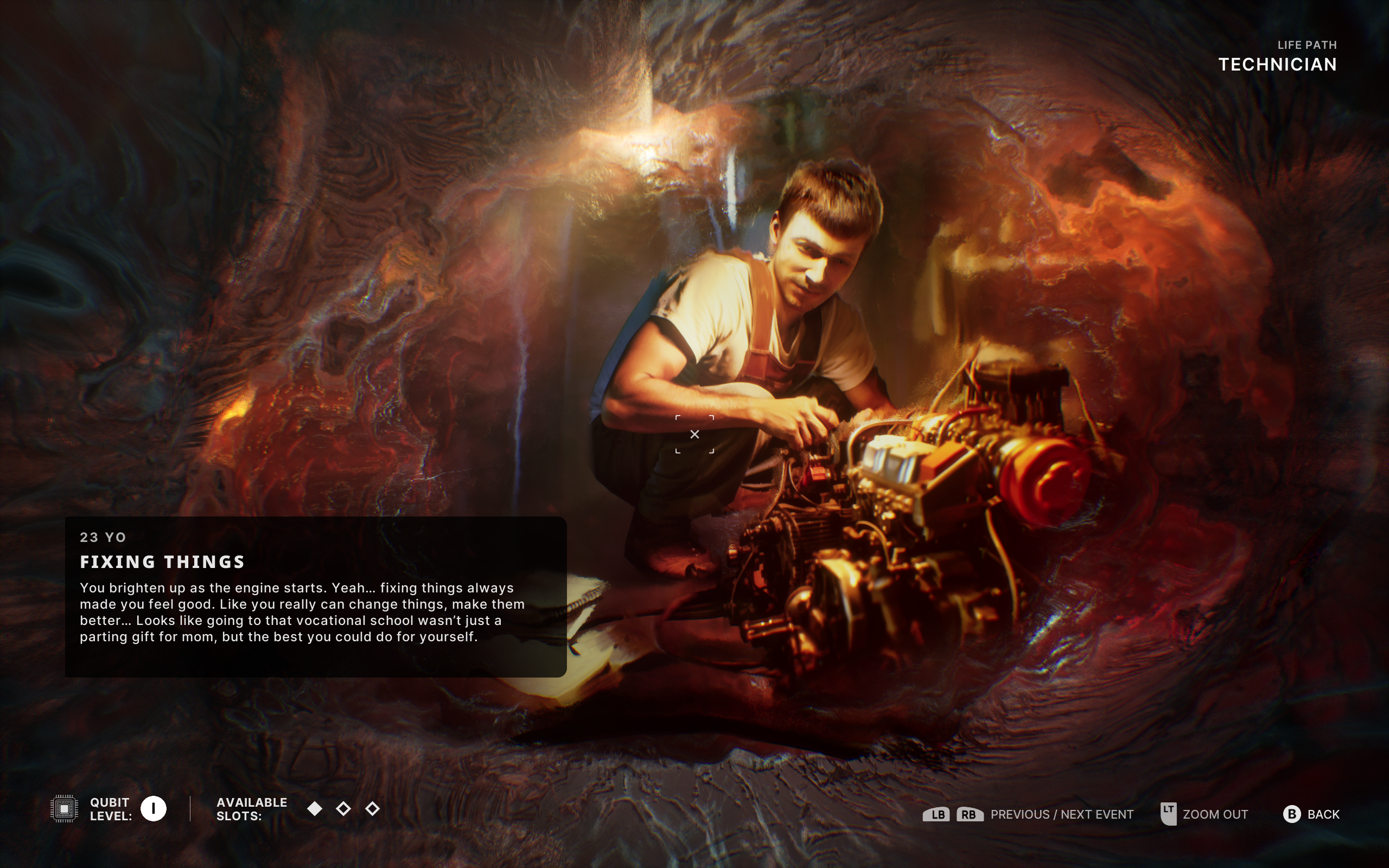
It's an awful situation that highlights The Alters' brilliance. Every new twist seems to ratchet up the tension, and for every problem (temporarily) solved three new ones pop up at once to make up for it—and how I personally choose to deal with them has a lasting impact on everything that happens afterwards.
I could take everyone I speak to at face value, be a good little corporate employee, and rush to agree with whatever they demand. Or I could turn it all into a tense game of cat and mouse. I can be as evasive as they are, I can go behind their backs and reach out to others, and I can encourage my Alters to go against the wishes of these mysterious people and stick with me. Myselves. Us. It's complicated.
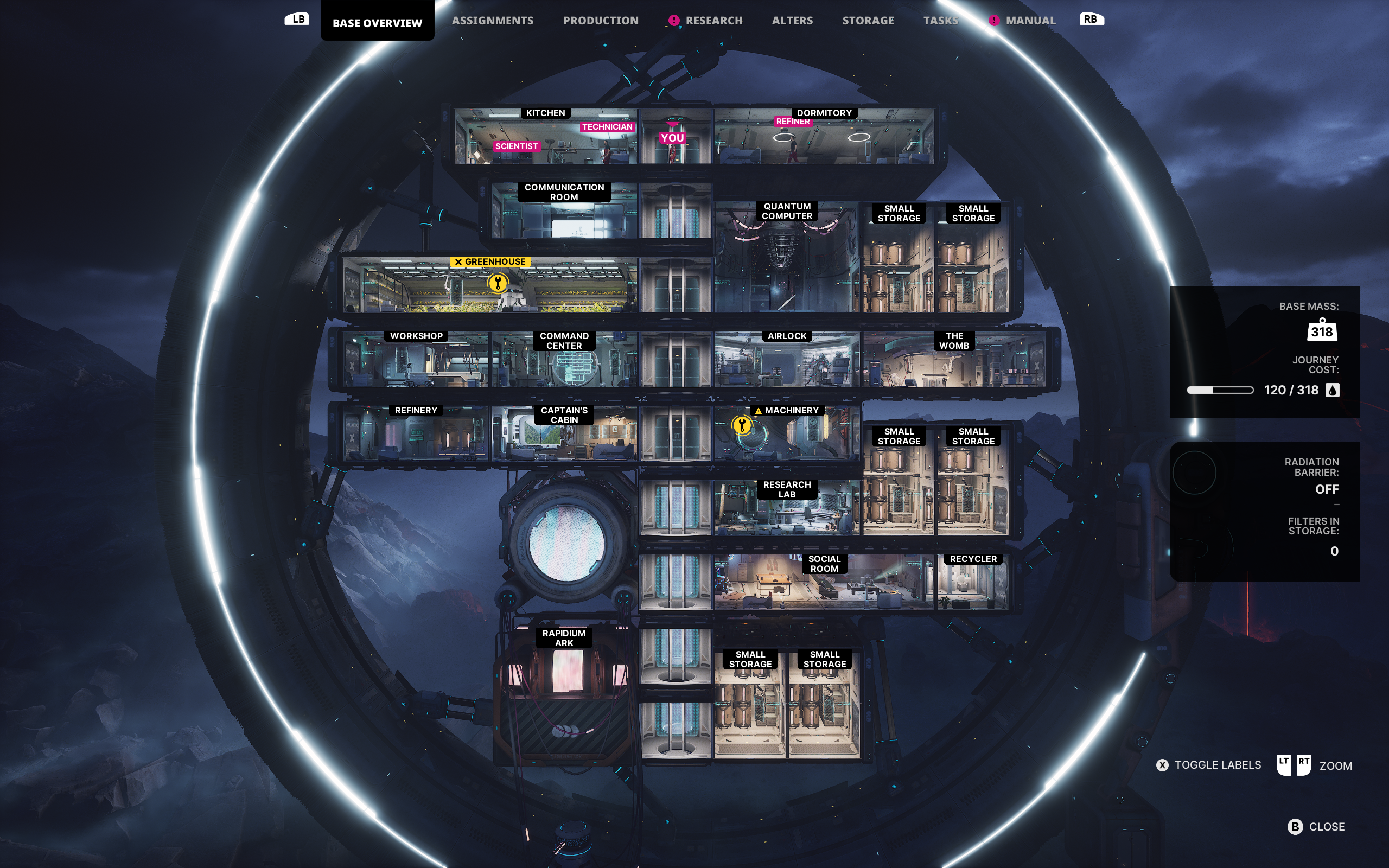
Self love
What I agree to and how I behave has as much of an impact on the day-to-day running of my base as it does the way the story goes and the epilogue I end up with. It was nice to see a Jan happily humming to themselves as we passed each other in the elevator in what passes for the morning here. I do want to make the Alters happy—they're all reflections of Jan, after all—and like everything else these interactions can go from ordinary problem solving to all-out stress in an instant. One minute I'm just trying to cheer a slightly reserved Jan up, the next I'm venturing into radioactive territory for extra metals because I agreed to build a social room so the Jans could watch movies and play beer pong together.
These optional tasks—providing everyone with decent food, finding and then giving someone an item that means a lot to them (the otherwise serious scientist's unexpectedly joyous reaction to the rubber duck ‘Marie Squackowska’ is just fantastic)—may not appear to directly contribute to the group's survival but they help foster a warm and productive environment, which is at least as important as not dying today when locked up with nothing but other versions of yourself for company.

It doesn't feel like extra work because the results are always immediate and obvious. Deep conversations with other Jans can unlock new personality-based dialogue choices—an assertive reply, for example. And the Alters are as likely to talk to each other as they are to me, and these are conversations I can casually overhear as I walk by on my way to another task.
Not that the results are always good. These Jans can not only fight among themselves, but they can even fight with the original Jan too, a worrying ‘rebellion’ stat individually tracked for all of them that can lead to some dangerous results.
I just have to learn to deal with these bumps in the road, as there's no magical perfect response that always makes every Jan happy. Some will be more pragmatic, caring more about survival than home comforts. Some would rather see my Jan push back when cornered than try to find common ground. Thankfully I'm not left blindly guessing who prefers what. Clear pop ups appear whenever someone's mood changes, and every Alter's life branch offers an easily skimmed timeline of their major life events and how they reacted to them.
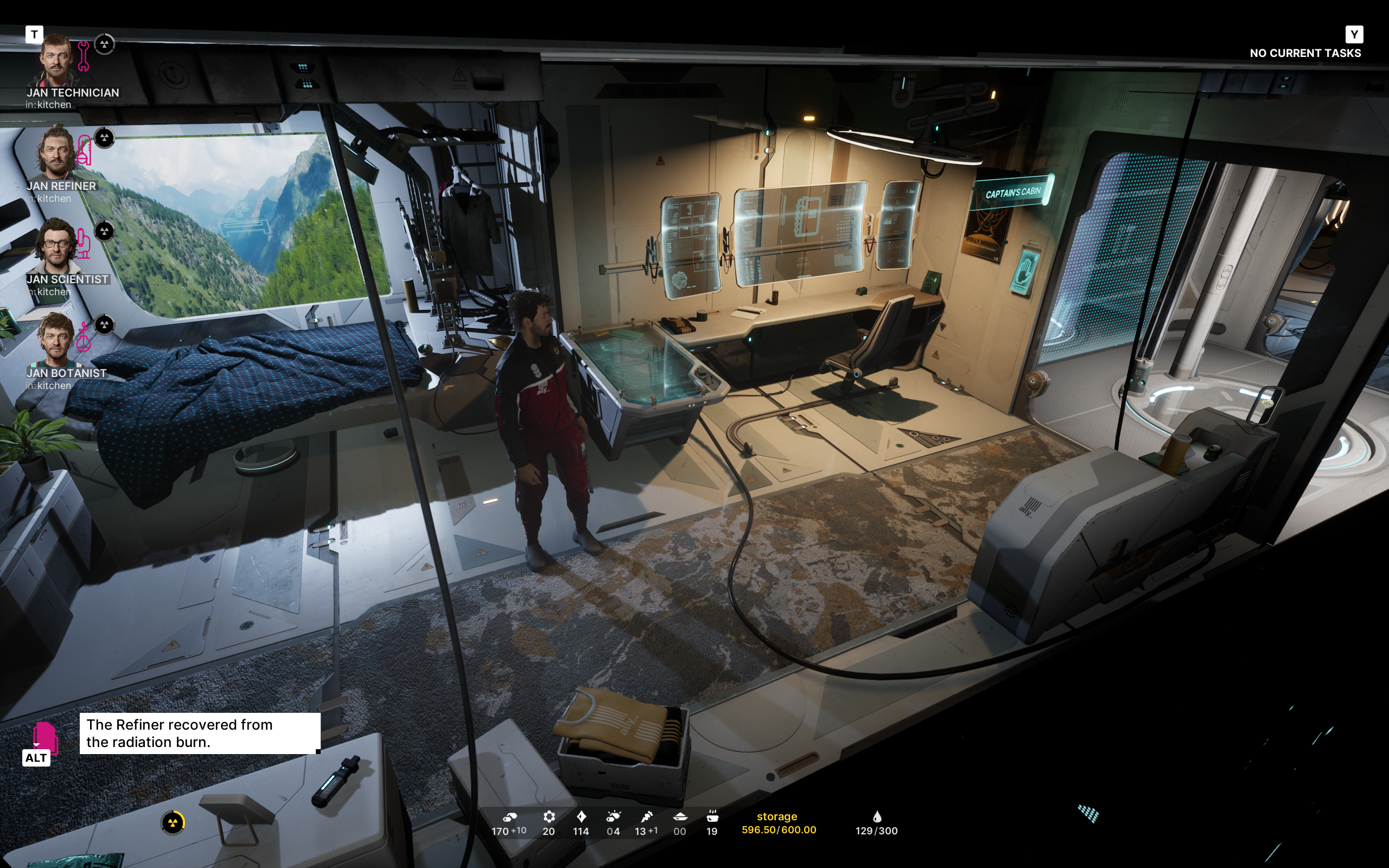
Getting out there
Whatever the latest chaos, there's always something specific to aim for, even if the what and how to go about it evolves as time goes on. The unique and always deadly areas each chapter takes place in are handcrafted and relatively compact, rather than auto-generated nothings for me to grab 20 of one thing and 30 of another in before rolling the base off somewhere else. There are blockages to blast away with lasers, prime mining spots to uncover, cargo drops to retrieve, shortcuts to discover and mysterious phenomena to research—if I dare to spend a little time on them, that is. There's always a point to me being here, specifically, that there is something worth discovering in the latest range of rock and danger.
Finding and then mining resources is an engaging process in this hazardous terrain, combining my own personal knowledge—blue smoke means an abundance of organic material, purple rocks indicate there are rich mineral deposits nearby – with physical problem solving. It's not enough to simply find metals or raw rapidium, I need to then uncover the perfect spot for the mining machine, and then set up a network of pylons to power it from my base.
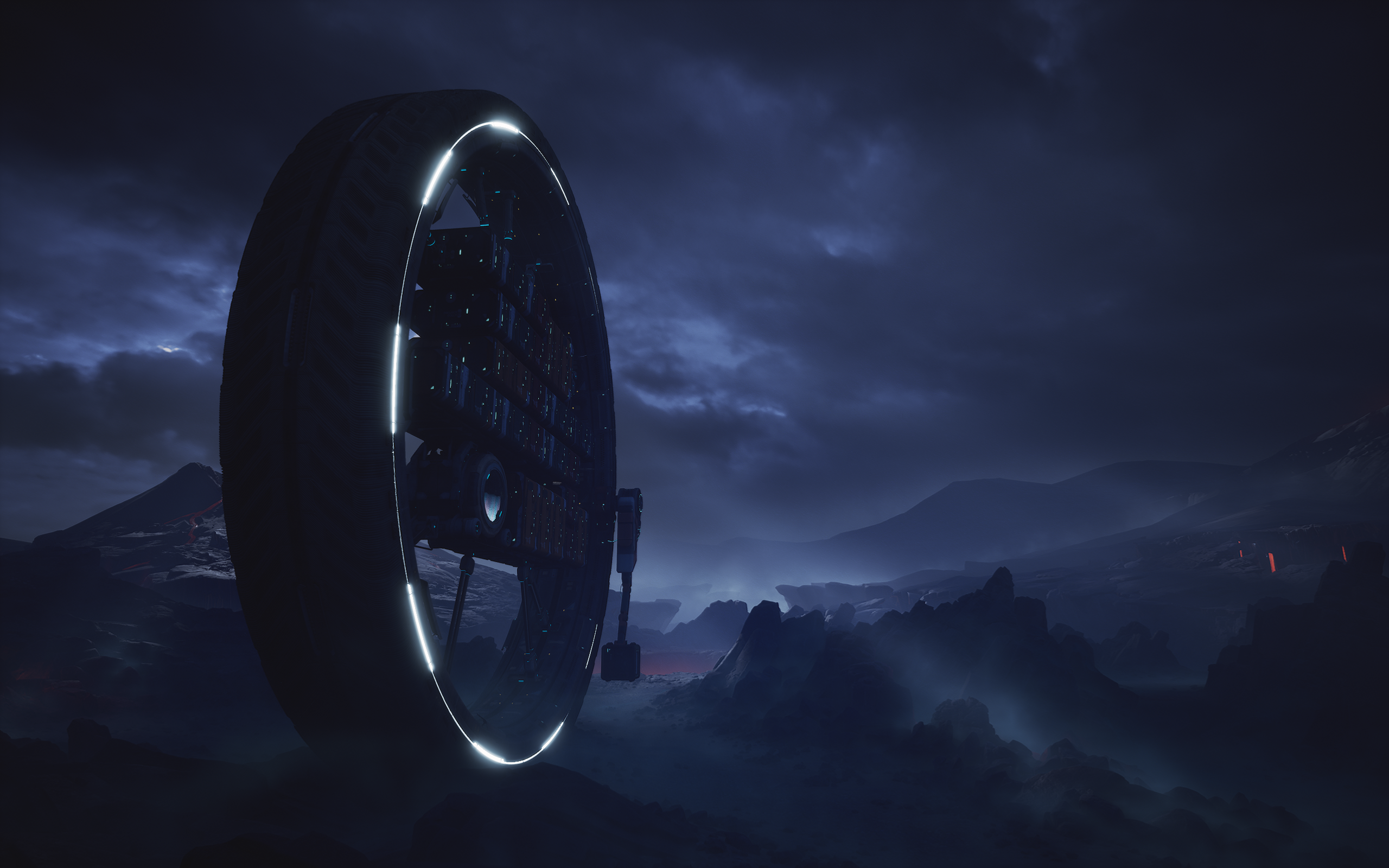
Mindless traipsing about in the gloom is kept to a minimum thanks to a convenient fast travel system, allowing me to hop between the base and any operational mining outpost or travel pylon I've established. Working outwards in this way turns this system into more than a convenient way to pop out, or get a headstart on further exploration. It's my own self-made flag planted in the radioactive dirt, every bit of help I have proof of something I've personally achieved against the odds.
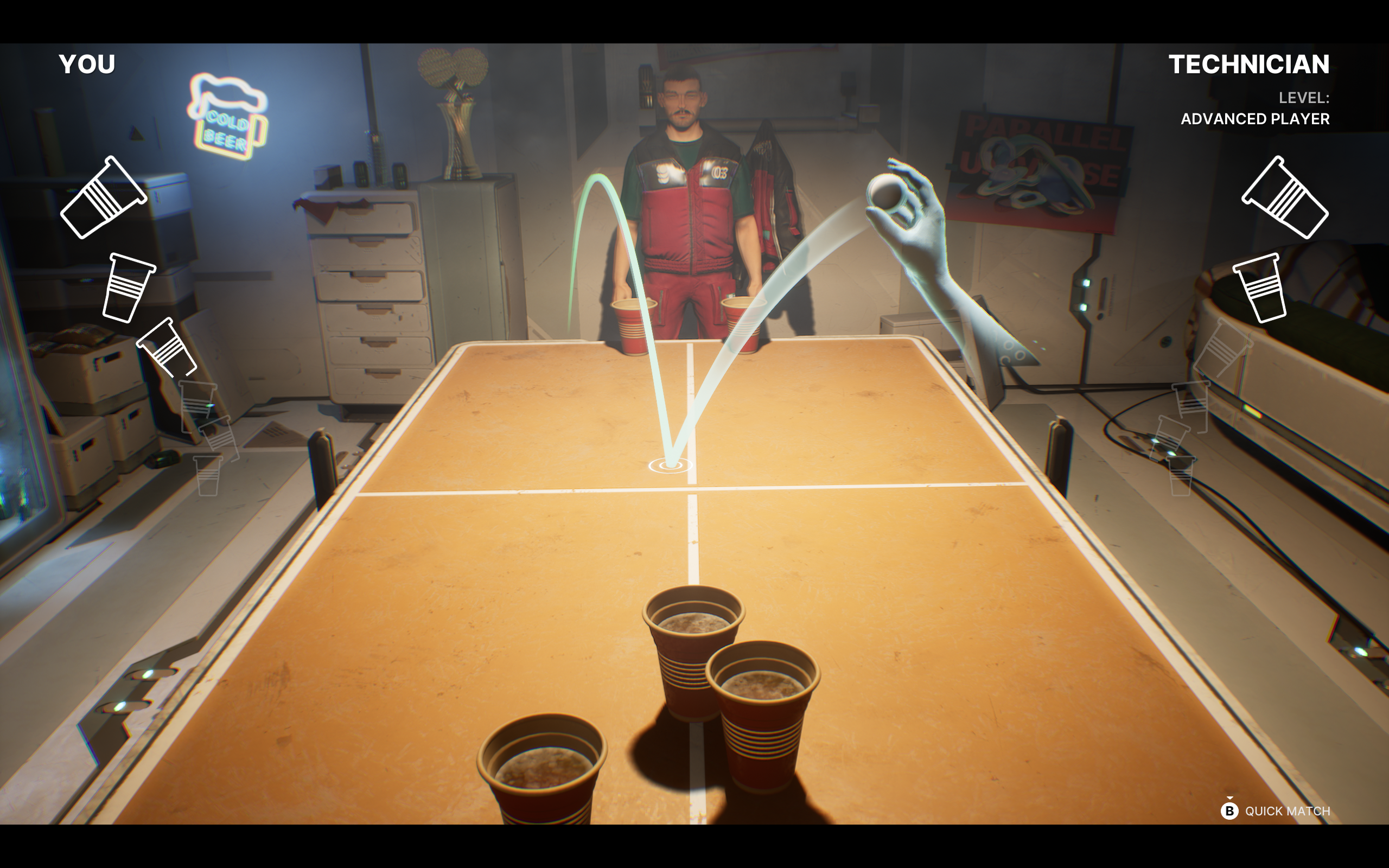
It took me a while to realise I wasn't building some cute automated process, machines busily whirring away while I slept or got on with other equally important tasks, but had to manually dedicate hours each day to operating everything myself. Every piece of machinery is built by hand in the workshop. Every mining operation is performed in person. And if there's a magnetic storm raging outside and I really need to secure some more materials? I'll just have to head outside anyway and get the job done.
Or ask someone else to do it. Wherever I am, I can easily assign fresh jobs to anyone at any time, and I can also auto-queue orders for anything I need regularly (food, for example), saving me the tedium of personally overseeing the production of mundane but necessary items. My Alters are proactive too, and will ask if they should work on something else the instant they finish their assigned task.
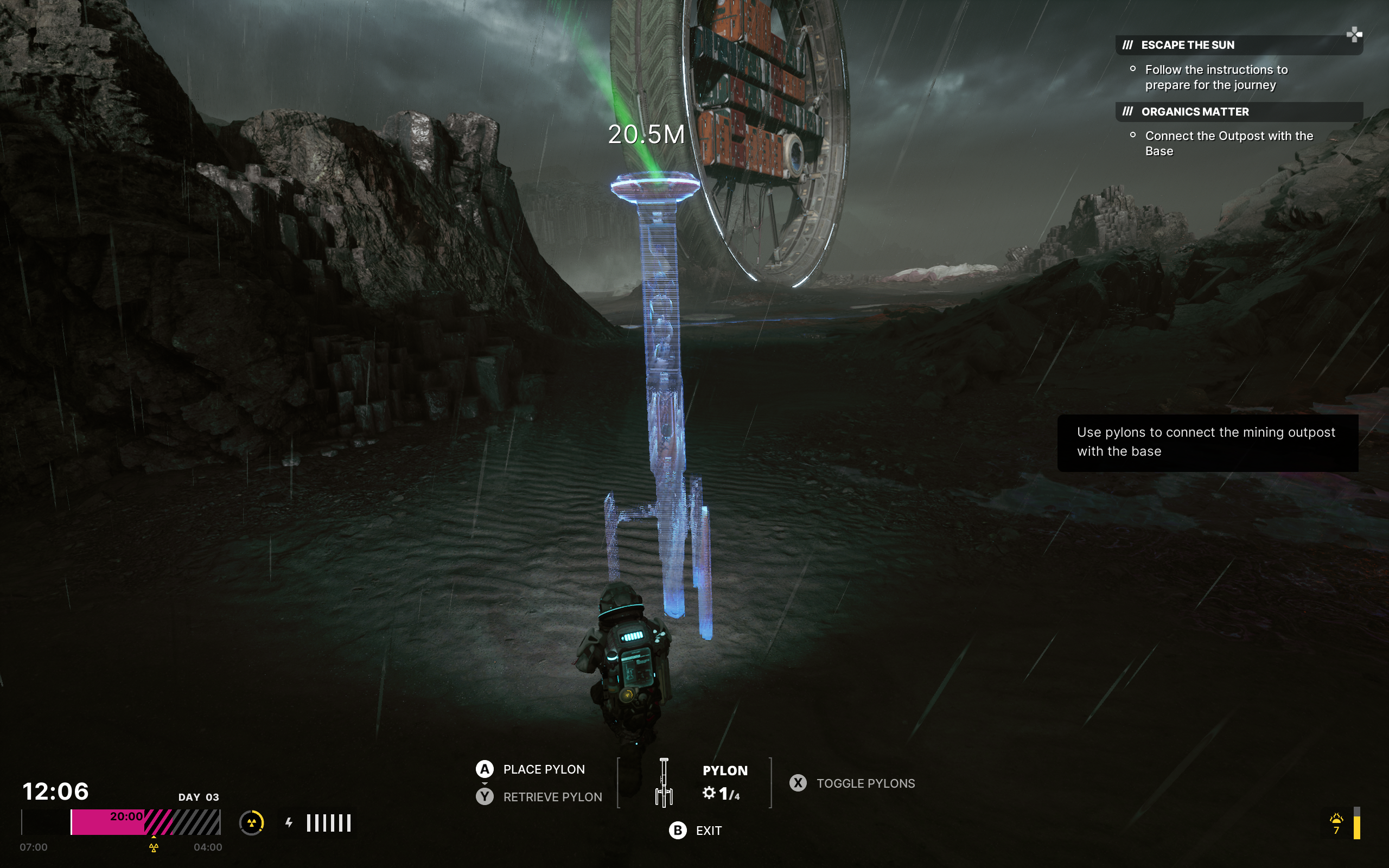
A fighting chance
The Jans are not alone on the planet, and while I'm exploring the surface I'll often get attacked by strange anomalies capable of flooding Jan's suit with deadly levels of radiation. On paper, combating these mostly clear and barely-defined wibbles in reality sounds like the weak link in a strong package—I aim a special torch at the ball in them until they go away. But in this context, these simplistic encounters are just what's needed. They're slightly unpredictable hazards that make the landscape feel more dangerous than it would have been without them, without being so challenging or complex to deal with I have to stop everything and pretend I'm playing a shooter for a couple of minutes. Jan just isn't that kind of guy, and this isn't that kind of game.
The Alters is tough, relentless, unforgettable—and highly replayable for a game with such a strong narrative. Every conversation choice I make inside the base matters, and every action I take outside of it has equal weight and meaning. With lots of possibilities for all the Jans and rarely any definitively correct choice of action, this anxiety-filled adventure is always one of my own making.



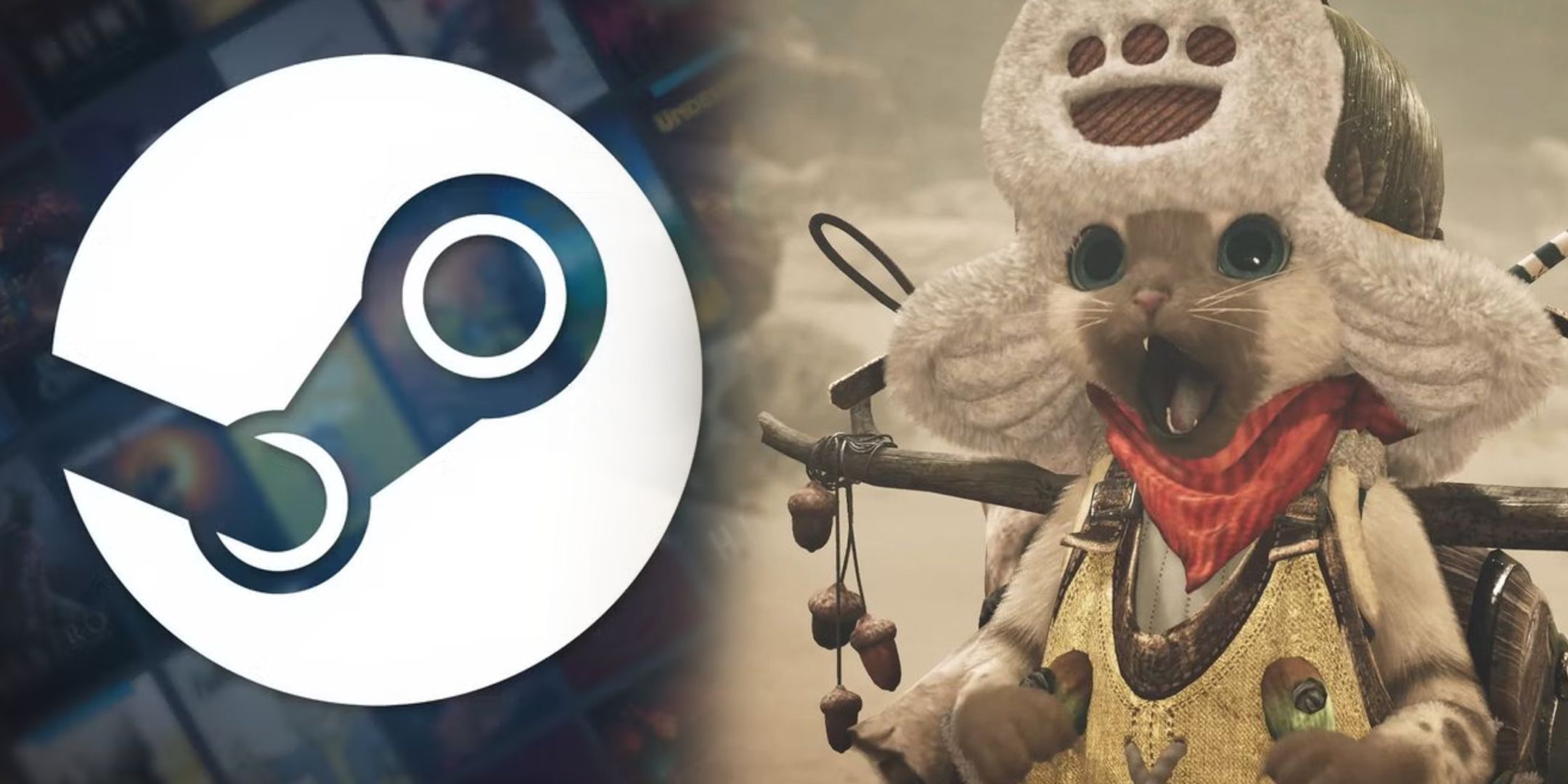









 Bengali (Bangladesh) ·
Bengali (Bangladesh) ·  English (United States) ·
English (United States) ·